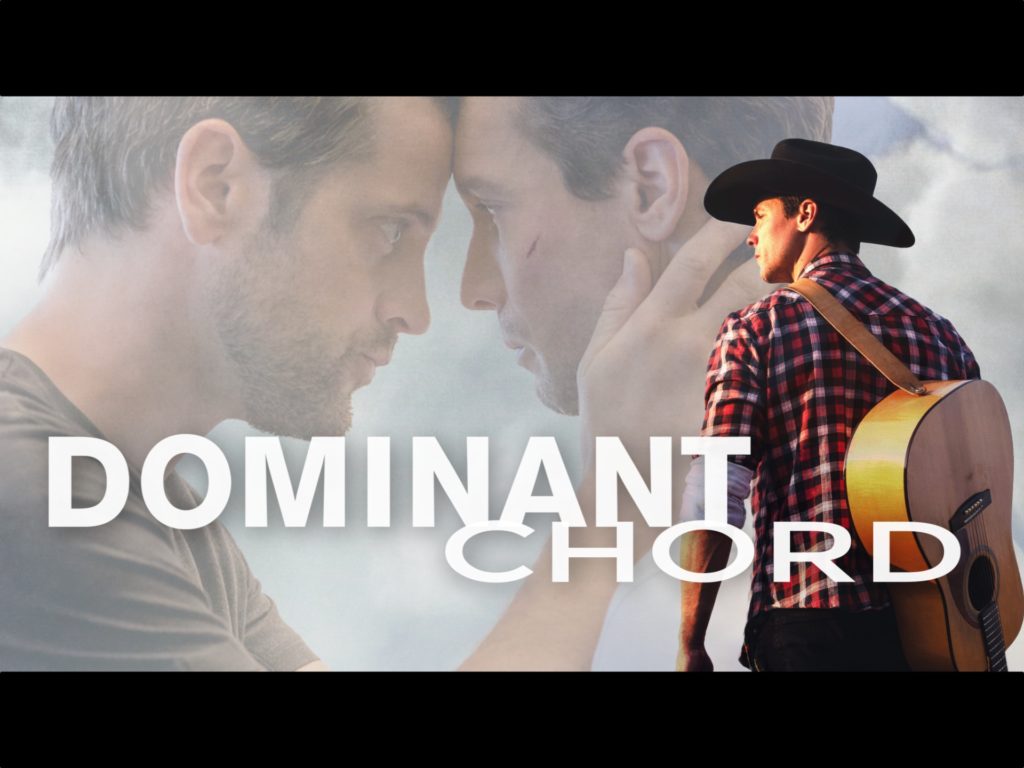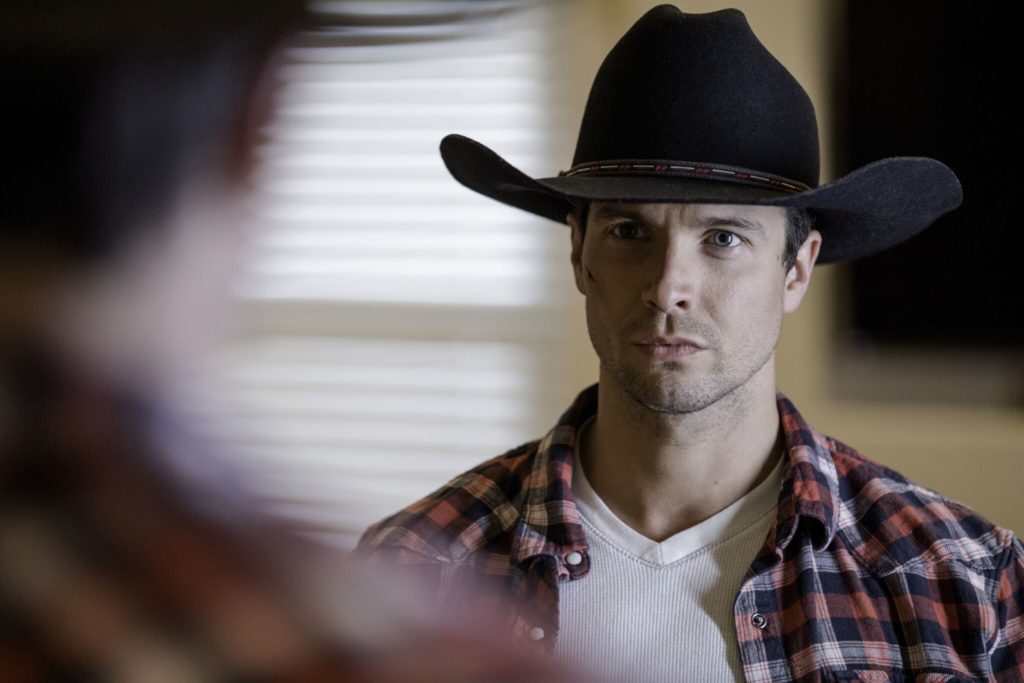Behind the Scenes of Gay Country Film “Dominant Chord”
A Chat With Jeremy Leroux, Director of Groudbreaking New Short
By Dale Henry Geist

“Dominant Chord,” a new film starring William Bertschinger, Clayton James, and Shawn Major, was written, produced, and directed by Jeremy Leroux, a Canadian filmmaker (and former country songwriter.) I’m genuinely excited about this project, a much-needed corrective to the “every country singer is straight” narrative that’s peddled by the industry.
I chatted with Leroux at the threshold of the film’s May 20th release.
DHG: This is a short film about a gay country singer, right? So what’s the setup, without giving too much away?
JL: Adam Charles is a closeted country star, and to get there he has had to lead a double life. He has a long time partner, Brian, who he met while he was building his career. Adam has always promised to come out publicly once his career reached a certain point, but every time that time came, he kept moving the goalposts. Now Adam is on the verge of being outed, and is forced to choose between the career he has built and the man he loves.
DHG: Got it. You got this idea, in part, from your own experience, right?
JL: Yes. Just under twenty years ago I walked away from the possibility of a career in country music. I was part of a songwriting group that did regular showcases, and had started compiling a group of demo songs and performed at charity events. Around the same time, rumors surfaced about the sexuality one of my country music idols, and I watched how even the hint of rumor sank his career. I also met my husband at this time and quickly realized that it would be impossible to have a career without leading a double life. I gave up and walked away. At the time I actually talked myself into believing that my taste in music was just evolving when I moved downtown, but years later I realized I got to the point I couldn’t listen to country music anymore because it hurt too much to not feel welcome in it.
I have always kept an eye on country music, though, and when Chely Wright came out in 2010 I thought…maybe now. Again in 2014, with the gay storyline on Nashville and Ty Herndon and Billy Gilman coming out – it gave me hope that maybe change would come. But country music has a way of talking about a topic for a while, and treating talking about it as if they have changed something when they actually haven’t. I thought, it’s time to do more than just talk about it. So I made the film.
DHG: Fantastic. So…it’s 2020, and if you’re a gay male country singer, you’ve still got to think long and hard about being out. What do you think makes country music so different from other genres where it’s easier to be out?
JL: I think the question maybe should be, “Why does country music get a pass when it comes to things like equality, diversity and inclusion?” I don’t know, really. Radio still holds so much power for country artists, and if you can’t get played on country radio, then it’s nearly impossible to break into the mainstream. Streaming has an opportunity to change the game, but they seem at best reluctant to do so – instead of adding a wider selection of artists to mainstream country playlists, they instead create token playlists such as women artists, diverse artists etc.

DHG: So why do you think women, POC and LGBTQ artists have a hard time getting played on country radio?
JL: Probably because it’s run by straight white men who have convinced themselves over time, and ingrained it into the culture, that that is what country listeners want. I believe current country radio doesn’t reflect the listener base, though. I think people’s tastes are a lot wider, more diverse and more accepting, and it would be a wise business decision for country radio to embrace this and make the tent bigger instead of trying to narrow it.
DHG: Hear, hear. So, Jeremy, what are you hoping to achieve by making this film?
JL: I want LGBTQ kids growing up to not believe some doors are closed to them because of who they are and who they love. The closet has persisted for a reason. Not just in country music but in many communities, LGBTQ people feel they need to hide who they are, not just for safety but to get and keep opportunities, and be accepted by their families, churches and other social groups. Simply put, it is unfair that this still happens in 2020! I want people to be able to see the human toll the closet takes, and maybe by seeing that, we can change one heart, one mind. Gus Kenworth coming out before the Sochi Olympics really impressed on me how powerful visibility and representation are. Country music has our brave artists as well, but instead of embracing them and growing, the genre has tried to reclassify their music, shoving it into categories like Americana or folk, and has sidelined and erased the artists, while carrying on with the status quo. If we wait for country music on the whole to do the right thing, we’ll be waiting for another 20 years or more. I’m done waiting.
DHG: Sounds like you mean it. So, obviously, you’ve got some country songs in this film. Tell us about them.
JL: Because the script is about country music and representation I started researching gay country artists. I had written a companion song for the film called “Secrets and Lies.” Originally I thought maybe I would record it for the film. In my search, though, I came across Brandon Stansell, who seemed to be on a parallel mission about LGBTQ representation in this genre. I read a Rolling Stone article he was featured in, and started looking into him and his music. When I heard “Hometown,” I knew I had to reach out to him. I had no idea if he would even respond, but he did, and I sent him the script. He was so impressed with the script that instead of recording the song I wrote, he offered to write an original song we could use for the film. The song, “Wide Awake,” he wrote with Jeffrey James, who was recently featured on NBC’s songland. It fit perfectly. I really went on trust, because I did not hear it ’til the song was finished and presented to me. I still get choked up when it comes on.
The other snippet of a song featured in the film, “Tequila Talking,” is a song I wrote and recorded in the late 90’s before I walked away. I got back together with the original producer, Geoff Robertson, and we updated the song to a more current sound. Since I started writing the film, I found my way back to country music and have been writing songs again. Maybe I’ll record something when I get a chance, and revisit some of those country dreams. But for now, I am very happy to be releasing this film and working towards developing a feature film based on the short, which, if we can get made, will be able to address a lot more of the inequality in country music.
DHG: Beautiful. “Dominant Chord” comes out on May 20th, right? Where can we see it?
JL: Yeah. On May 20th, it begins streaming on Dekkoo, a gay streaming service. It will also be available for rent and purchase on Vimeo On Demand. The plan was a release on Amazon On Demand as well, but like many other things, due to COVID-19, there is a huge publishing backlog, so I can’t say for certain when that will be. Any further platform expansions or updates we will be readily available on our website. After our successful festival run, we’re really excited to finally be able to bring it to a worldwide audience!